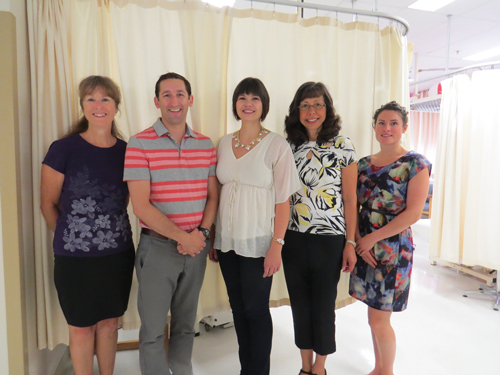Fall 2014 (Volume 24, Number 3)
Rheumatology Perspectives:
On Working With a Nurse
By Jacqueline C. Stewart, BSc (Hons), B Ed, MD, FRCPC; and
Michelle M. Teo, MD, FRCPC
Download PDF
We are fortunate to have the new billing code in British Columbia for “Multidisciplinary Care” which requires the services of a nurse at the visit. For a busy rheumatologist this has created a very positive impact enabling us to provide better service to our complex patients with inflammatory disease. I hired a nurse, Anne Scott, to work part-time with me in my inflammatory arthritis (IA) clinic initially one and then one-and-a-half days a week, which has already increased to two days a week. There is an initial training period required, but now my nurse is able to assess the patient and determine their major concerns at the visit and she is continually improving in doing joint counts. She also collects information such as morning stiffness, patient global assessment (PtGA), and does a DAS28 calculation. One of the major improvements in managing complex patients, especially those on biologics, is the medication counselling provided by the nurse. For patients starting disease modifying anti-rheumatic drugs (DMARDs) or biologics, she discusses the side effects of the drugs and other issues such as birth control (if applicable), immunizations, and instructions for planned surgery with the patients. This gives me more time to evaluate the patients and prescribe treatment, therefore making visits more efficient. In addition, all injection training for methotrexate (MTX) and biologics is done in the clinic with the patient administering their first injection with nursing supervision. For follow-up patients, she will assess any possible side effects they may be having, as well as remind them about special issues and precautions with respect to their medication. Finally, the nurse oversees the completion of forms to be submitted to BC Pharmacare to obtain medication coverage, particularly for biologics, which relieves me of a large burden of paperwork. Integration of a nurse into my practice has been very successful.
Jacqueline C. Stewart, BSc (Hons), B Ed, MD, FRCPC
Rheumatologist,
Penticton Regional Hospital
Penticton, British Columbia

From left to right: Helen Sather (Infusion Clinic LPN), Joel Shaw (Dr. Teo's nurse), Dr. Michelle Teo, Dr. Jacqueline Stewart, Anne Scott (Dr. Stewart's nurse).
I am new graduate who took over a mature rheumatology practise in a community setting; what a steep learning curve the past year has been! As a result, my rheumatology knowledge and experience has increased immensely, but so has my awareness of the current issues related to providing care for our patients. It is no surprise to anyone, especially the wait-list patients, that there is a general shortage of rheumatologists. The ability to see new consults is also limited by the sheer number of patients with inflammatory diseases requiring life-long follow up. With an aging population who are increasingly presenting with both inflammatory and non-inflammatory disease, it is no longer efficient for the rheumatologist to be a one-person show.
I initially hired Joel, my nurse, for one day a week; he now works full time. I quickly realized that while Joel saves me time by doing patient teaching and counselling regarding DMARD medications, patients feel comfortable discussing lifestyle issues related to their arthritis with him. He covers a large range of topics−including diet, exercise, rehabilitation, complementary therapies, sleep, smoking cessation−issues that come up during the majority of follow-up visits. With the increased risk of morbidity and mortality amongst our patients, having a nurse is an added opportunity to make a positive change to modifiable risk factors.
I often hear from our patients that they appreciate our team-oriented approach to their care. Traditionally, rheumatology allied health care has been limited to physiotherapists (PTs) and occupational therapists (OTs). Involving nurses is the next logical step. I feel fortunate that I am able to incorporate a nurse into my practice, especially with my interest in rheumatology models-of-care. We look forward to exploring ways to further this role in order to continue enhancing rheumatologic care.
Michelle M. Teo, MD, FRCPC
Rheumatologist,
Penticton Regional Hospital
Penticton, British Columbia |



